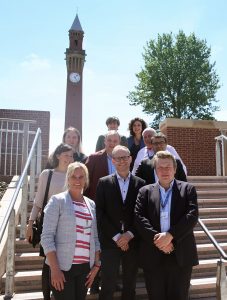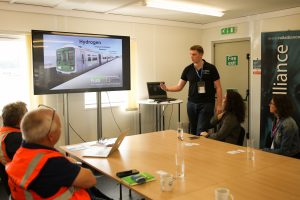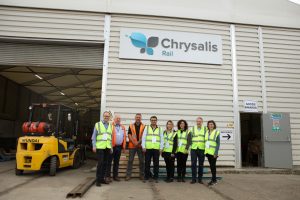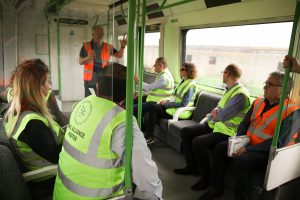Eli Rees-King discusses the European Railway Clusters Initiative (ERCI) and how it is helping SMEs.
The Rail Alliance is one of the founding members of the ERCI (European Railway Clusters Initiative) an exciting project that among other activities, the member companies and institutions of ERCI partner clusters benefit from: – Accelerated access to other European companies and institutions – Active support in the participation at EU research and development programs, e.g. Shift2Rail – Access to ERCI events all over Europe – Marketing and business development activities within the EU and beyond – European lobby for SME interests.

We have just spent the two days meeting at the University of Birmingham (Birmingham Centre for Rail Research & Education) to discuss the long term vision of the group and the additional specialist activities that will offer benefits for member companies of the ERCI cluster organisations with the third day visiting Quinton Rail Technology Centre in Long Marston. ERCI guests were treated to a ride on the Vivarail Battery Train as well as a visit over to Chrysalis – a rolling stock refurbishment business based on site. Presentations were delivered by Colin Flack, Director at QRTC, Neil Bates, Design Director at Vivarail, Charles Calvert, HydroFlex project for University of Birmingham and Martin Little, Commercial Director at Rail Alliance. A great experience for all involved!
Our part in the European Rail Clusters Initiative
How did this journey begin? Ten years ago, the Rail Alliance made an important decision to help establish the European clusters network and set up the ERCI (European Rail Clusters Initiative). It was a decisive milestone and the cooperation agreement was officially signed during InnoTrans 2010 in Berlin. ERCI is now the leading meta-cluster of the railway industry in Europe uniting 14 innovation clusters from ten European countries. Together, the ERCI helps to connect the ideas and interests of close to 2000 small and medium-sized businesses in the industry and is their voice and lobby at European level. It helps member companies to grow – through improved access to European partners and customers, accelerated technology transfer and joint marketing in, and outside, of the EU. Over the past years, ERCI has established governance structures and has established itself as the European railway cluster network.
PERES – Promoting European Rail Excellence outSide of Europe
This leads me on to introduce PERES. The PERES 4i-partnership, was awarded under the umbrella of the EU cluster collaboration platform in January 2018. An 18-month programme of which Rail Alliance is one of four ERCI partners appointed to deliver it alongside DITECFER (Italy), i-Trans (France), BTS Rail Saxony (Germany) and the Serbian Railway Cluster for South-East Europe RCSEE. PERES is led by Italian cluster DITECFER.
‘The fact that the EU Commission is now explicitly supporting rail industry SMEs in market development is strengthening our activities. I am sure that new and interesting partnerships will arise from the common activities with other European companies’ said ERCI spokesperson and PERES participant Dirk-Ulrich Krüger from BTS Rail Saxony.
PERES aims to intensify and lead on international cluster cooperation to support companies in the European railway industry being represented (mainly SMEs) in internationalisation processes concerning markets outside of the EU. The clusters, in fact, also include large enterprises at the top of the supply chain and scientific bodies, but the overriding objective remains, and that is for PERES to empower the SMEs to solve the challenges faced when entering international markets.




Eli Rees King, Marketing Director, Rail Alliance
